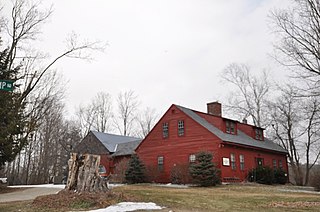
The Moses Eaton Jr. House is a historic house on Hancock Road in Harrisville, New Hampshire. Built about 1782, it is one of the oldest houses in the eastern part of Harrisville, and was home for fifty years to the itinerant folk stenciler Moses Eaton Jr. The house was listed on the National Register of Historic Places in 1988.

The Brook Road Inn, formerly the Backside Inn, is a historic inn at 1171 Brook Road in Goshen, New Hampshire. The inn, which now provides lodging only, is located in an 1835 farmhouse that is one of a regional cluster of 19th-century plank frame houses. The inn was listed on the National Register of Historic Places in 1985.

The Burford House is a historic house on New Hampshire Route 10 in Goshen, New Hampshire. Built in 1843, it is one of a cluster of locally significant 19th-century plank-frame houses, and was for many years home to Walter Nelson, the local historian who researched these homes. The house was listed on the National Register of Historic Places in 1985.

Windswept Acres, or the Powers House, is a historic house on New Hampshire Route 31 in Goshen, New Hampshire. Built about 1800, it is one of Goshen's oldest houses, and one of a cluster of plank-frame houses in the community. The house was listed on the National Register of Historic Places in 1985.

The Cote House is a historic house on Goshen Center Road in Goshen, New Hampshire. Built about 1846 as a schoolhouse, it is one of a cluster of plank-frame houses in Goshen. The building served as a school until 1926, and is now a private residence. The house was listed on the National Register of Historic Places in 1985.

The Covit House is a historic house on Goshen Center Road in Goshen, New Hampshire. Built about 1800, it is one of the oldest surviving and best-preserved plank-frame houses in the town. The house was listed on the National Register of Historic Places in 1985.

The Durham House is a historic house on Ball Park Road in Goshen, New Hampshire. Built about 1860, it is one of a cluster of plank-frame houses built in the rural community in the 19th century. This one is further note for its Greek Revival features, and its construction is tentatively ascribed to James Chandler, a noted local builder. The house was listed on the National Register of Historic Places in 1985.
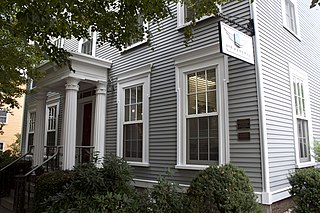
The John Hart House is a historic house at 403 The Hill in Portsmouth, New Hampshire. Built in the late 18th century, this comparatively modest house exhibits stylistic changes reflective of architectural trends up to the mid 19th century. It was moved to its present location in the 1970s as part of a road widening project. It was listed on the National Register of Historic Places in 1972.

The Garber House is a historic house on Lempster Coach Road in Goshen, New Hampshire. Built about 1835, it is one of a cluster of plank-frame houses in the rural community, which at one time had an unusually fine Greek Revival entry surround. The house was listed on the National Register of Historic Places on June 21, 1985.

The Giffin House is a historic house on New Hampshire Route 10 in Goshen, New Hampshire. Built in 1835, it served as a schoolhouse until 1957, and is one of three surviving 19th century schoolhouses in Goshen. It is also part of a cluster of plank-frame houses built in the community. The house was listed on the National Register of Historic Places in 1985.

The Capt. John Gunnison House is a historic house on Goshen Center Road in Goshen, New Hampshire. Built in 1812, it is one of the town's finer examples of Federal architecture. It was the childhood home and likely birthplace of John Williams Gunnison, a military officer who led exploratory expeditions in Colorado. The house was listed on the National Register of Historic Places in 1979.
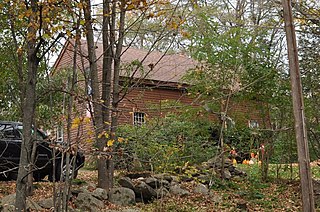
The Janicke House is a historic house on Goshen Center Road in Goshen, New Hampshire. Built about 1830, it is one of a regionally distinctive cluster of plank-frame houses built in the 19th century. The house was listed on the National Register of Historic Places in 1985.
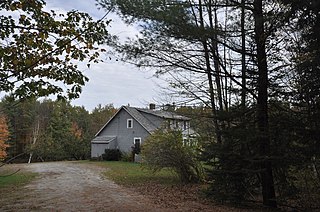
The Lear House is a historic house on Province Road in Goshen, New Hampshire. Built about 1810, it is one of the oldest of a cluster of plank-frame houses in the rural community. Its first owner, Robert Lear, was one of Goshen's first colonial settlers. The house was listed on the National Register of Historic Places in 1985.
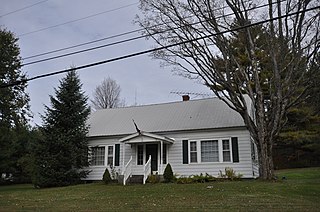
The Pike House is a historic house, located on New Hampshire Route 10 in the village of Goshen, New Hampshire. Built about 1812, it is one of a cluster of 19th-century plank-frame houses in the rural community. The house was listed on the National Register of Historic Places in 1985.
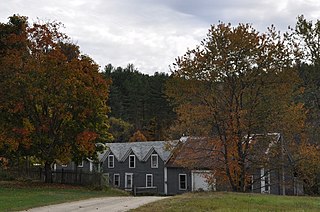
The Purnell House is a historic house on New Hampshire Route 10 in Goshen, New Hampshire. Built about 1830, this Cape style house is one of a cluster of 19th-century plank-frame houses in the town. The house was listed on the National Register of Historic Places in 1985.

The Scranton House is a historic house at 711 Brook Road in Goshen, New Hampshire. Built about 1850, it is one of a cluster of plank-frame houses in Goshen, and is unusual in that group for its use of thinner planking. The house was listed on the National Register of Historic Places in 1985.

The Seavey House is a historic plank-frame house in Goshen, New Hampshire. It is located on the west side of New Hampshire Route 10, just south of its junction with Brook Road. It was built about 1860 by John Chandler, a prolific local builder of plank-frame houses. The house was listed on the National Register of Historic Places in 1985.

The Stelljes House is a historic house on New Hampshire Route 31 in Goshen, New Hampshire. Built about 1800, it is one of the oldest of a cluster of plank-frame houses in Goshen. The house was listed on the National Register of Historic Places in 1985. It has possibly been demolished.

Welcome Acres is a historic house in Goshen, New Hampshire. It is located on the east side of New Hampshire Route 10, about 1/2 mile north of its junction with Brook Road. Built c. 1835, it is one of a cluster of plank-frame houses in the community, and is unusual in that set for being two stories high, and for its unusual construction. The house was listed on the National Register of Historic Places in 1985.

The Williamson House is a historic house on Messer Road in Goshen, New Hampshire. Built about 1850, it is one of a cluster of plank-frame houses in the town, and is unusual in that group for its framing style. The house was listed on the National Register of Historic Places in 1985.























